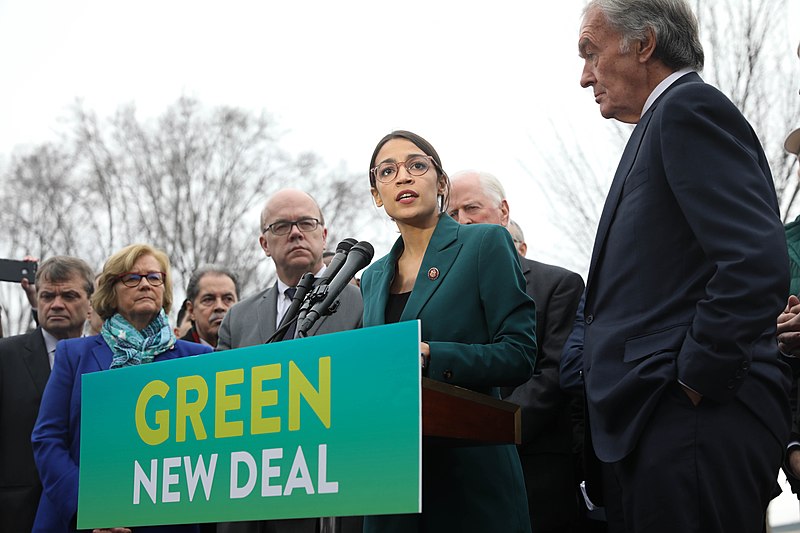Green New Deal Heats Up Debate in Congress
The New Deal was a program put into place by then President Franklin D. Roosevelt in 1933 as a way to provide relief from the Great Depression to the American people. The program worked to decrease unemployment, increase wages, and revitalise the people’s trust in the banking system.
The New Deal has been noted as saving capitalism, and many of the provisions and programs are still in place today, serving as the groundwork for the current mixed economy of the United States.
“The New Deal was a series of government programs to try and put people to work, and give them paychecks and be able to provide for themselves at least at a basic level in a time of dire need,” social studies teacher Mr. Thomas Beaupre said.
The existential threat to our planet’s future is easily comparable in importance as the Great Depression was in the 1930’s. Rights now, carbon dioxide levels are higher than they’ve ever been recorded in the history of the planet based on preserved ice samples. Greenland’s ice caps has lost an average of 286 billion tons of ice a year from 1993 to 2016. These devastating changes have been as a direct result of human interaction, and without changes being made, more irreversible lasting changes are on the horizon.
Based on a United Nations report, we have 12 years to fully combat climate change before the problems become catastrophic. Rising sea levels would cause flooding; extreme heat could lead to drought and famine; warming oceans would kill off large amounts of marine life causing instability of the global ecosystem. There’s no doubt that we should be doing whatever it takes to prevent these travisties from occurring. The question is what the American taxpayer is willing to do about it.
According to new polling done by Yale University and George Mason University in October 2018, over 80 percent of registered voters support the green new deal including over 60 percent of Republicans, so it doesn’t seem like the many people are afraid of the 19 trillion dollar price tag over the next 10 years.
Any idea proposed doesn’t go without it’s opposition, some people have concerns of how realistic the Bill would be in getting passed.
“The Green New Deal calls for the US to be carbon neutral, and greatly change our infrastructure along with some social programs as well,” sophomore Lucas Zhang said. “Personally I think they have good intentions, but this specific plan seems to be tad too ambitious to achieve real change.”
There’s no question that cost should come into consideration when discussing any type of government spending, but when it comes to prioritizing what to be spent on, the health of our planet should be on the top of the list.
And just helping save the planet wouldn’t be the only benefit to a Green New Deal, large economic benefits are also present. Estimates show that the demand for innovation will create over 10 million private sector jobs, which would immensely help reverse some of the effects of outsourcing and automation in the past few years. Not to mention, the jobs guarantee provision of the bill which would allow for any person willing to work to become a government employee and be given a living wage, allowing for them to participate in the economy on their own.
When compared to the future costs of climate change, a mere 19 trillion dollars doesn’t seem like that much. The cost of adaptation from the year 2050 and onward would be around 500 billion dollars per year to migrate people, transport resources, and provide relief for people affected by life threatening weather events.
So we’re faced with two options: face the consequences of climate change, lose countless lives, force species into extinction, displace millions from their homes, and have to pay the economic and humanitarian price later; or pay the smaller cost now, creating millions of jobs, refining our energy grid, and reforming our priorities on a global economy.
Senior Marc Ramson is a first-year staff reporter for the Spotlight. He enjoys writing editorials and expressing his opinions on controversial topics....


